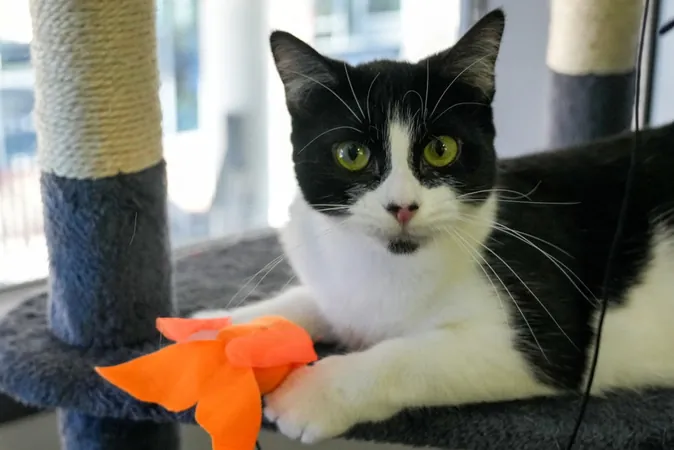
Protect Your Cats from the Dangers of Bird Flu: What You Need to Know Now!
2024-12-29
Author: Rajesh
The recent tragic death of a house cat in Oregon, linked to a contaminated pet food recall, has sparked urgent discussions about the ongoing threats posed by bird flu to our beloved pets. This highly contagious virus, also known as H5N1, has been making headlines as it spreads among wild birds, poultry, and increasingly, some domestic animals.
Since its first confirmation in U.S. dairy cattle back in March, the bird flu virus has shown that it can cause sporadic illnesses in humans as well, primarily among those working on farms. In affected areas, health officials have mandated the culling of infected livestock to halt further dissemination of the virus.
A Shocking Discovery in Oregon
Authorities in Oregon identified that the cat's illness stemmed from frozen cat food that contained raw turkey, which was later confirmed to be tainted with the virus. This raises a critical alert for pet owners as many choose to feed their cats raw diets. Veterinarian Dr. Michael Q. Bailey, the incoming president of the American Veterinary Medical Association, cautions against the dangers of raw meat and unpasteurized dairy products, as they can harbor viruses and germs capable of harming pets. Cooking or pasteurizing these products is essential to safeguard against bird flu and other harmful pathogens.
Is Your Cat at Risk?
While infections in pets are still relatively rare, cats are particularly susceptible to the H5N1 virus. The recent outbreak has seen a concerning rise in cases among various types of cats, from feral felines to indoor companions and even wild big cats. Furthermore, a troubling investigation is underway in Los Angeles County regarding the deaths of four house cats reportedly linked to recalled raw milk.
In contrast, dogs appear to be less vulnerable to the virus, yet they should also only be fed thoroughly cooked foods to avoid potential risks.
Safety Tips: Protecting Your Feline Friend
To ensure your cat's safety, here are essential precautions to consider: - **Avoid Raw Diets:** Do not feed your cat unpasteurized dairy products or raw meat. - **Limit Outdoor Access:** Keep your cats indoors to prevent them from hunting wildlife like birds, which can carry the virus. - **Stay Alert for Symptoms:** If your cat displays signs of lethargy, loss of appetite, difficulty breathing, or if you notice any odd behavior such as hiding or increased sleepiness, contact your vet immediately. - **Hygiene Matters:** Wash your hands thoroughly after handling any poultry or animals, and avoid touching sick or dead birds.
Recognizing the Symptoms of Bird Flu in Cats
Symptoms can include: - Loss of appetite - Fever - Lethargy - Difficulty breathing - Discharge from the eyes or nose - Tremors or seizures If your cat displays any of these distress signals, it’s crucial to consult your veterinary clinic right away, especially if there are vulnerable individuals in your household.
Recall Alert: Northwest Naturals Pet Food
In a safety alert for pet owners, Northwest Naturals, based in Portland, Oregon, has issued a voluntary recall of a specific batch of their 2-pound Feline Turkey Recipe raw frozen pet food after it tested positive for the H5N1 virus. This product was distributed to multiple states including Arizona, California, and Florida, and it holds “best if used by” dates of May 21, 2026, and June 23, 2026. Consumers are urged to dispose of this product and seek refunds from their point of purchase.
Conclusion: Be Proactive!
As bird flu continues to pose a risk, the onus is on pet owners to take preventative measures to protect their furry friends. Stay informed, adhere to safe feeding practices, and be vigilant about your pet’s health. Your proactive efforts can make all the difference in keeping your pets safe from this dangerous virus!





 Brasil (PT)
Brasil (PT)
 Canada (EN)
Canada (EN)
 Chile (ES)
Chile (ES)
 Česko (CS)
Česko (CS)
 대한민국 (KO)
대한민국 (KO)
 España (ES)
España (ES)
 France (FR)
France (FR)
 Hong Kong (EN)
Hong Kong (EN)
 Italia (IT)
Italia (IT)
 日本 (JA)
日本 (JA)
 Magyarország (HU)
Magyarország (HU)
 Norge (NO)
Norge (NO)
 Polska (PL)
Polska (PL)
 Schweiz (DE)
Schweiz (DE)
 Singapore (EN)
Singapore (EN)
 Sverige (SV)
Sverige (SV)
 Suomi (FI)
Suomi (FI)
 Türkiye (TR)
Türkiye (TR)
 الإمارات العربية المتحدة (AR)
الإمارات العربية المتحدة (AR)